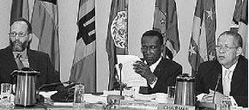Canada-CARICOM trade talks on again - Firm Nov 9 date set for formal negotiations
Published: Friday | September 25, 2009


( L - R ) Malahoo-forte, Mathurin
The on-again, off-again negotiations towards a World Trade Organisation (WTO)-compliant free-trade agreement between the Caribbean Community (CARICOM) and Canada is on again.
After being suspended last year, the sides have now agreed on a November 9 date to start the first round of formal negotiations towards a trade pact to replace the more than 20-year-old Caribbean-Canada Trade Agreement (CARIBCAN) thatwas based on preferences to the Commonwealth Caribbean and which has since been ruled out of sync with WTO rules.
Preparatory talks
CARICOM's Office of Trade Negotiations (OTN) said this week the date was decided at a ministerial meeting between the regional grouping's trade ministers and Canada's minister of international trade. The meeting was held in Port-of-Spain, Trinidad, earlier this month.
"These were preparatory talks at the ministerial level," said Senator Marlene Malahoo-Forte, Jamaica's new junior foreign minister, who attended the meeting.
Malahoo-Forte said the region was looking to settle on an agreement that covered trade in goods and services, but suggested that the region would be insisting on a development focus for any agreement, a long-standing beef of CARICOM leaders.
"The region is looking at a development-oriented trade agree-ment," she told the Financial Gleaner in an interview.
Important issues
She said the development focus being demanded included capacity building for the economies of the 15-member trade and functional cooperation bloc.
Last year, CARICIOM, through the then Caribbean Regional Nego-tiating Machinery, indi-cated that the broad outline of an agreement would have included market access, rules of origin, trade facilitation, sanitary and phytosanitary measures, technical barriers to trade, investment and trade-in services, trade-related issues, labour and the environment, institutional provisions and dispute settlement.
While Malahoo-Forte, the contro-versial resident magistrate-turned-politician, said the areas have not changed, she conceded that there remained sticking points, which explains the limited scope agreed so far.
Both sides, she said, would have to hammer out the still-problematic areas.
She said while the region is pushing a development agenda, Canada remained somewhat reluctant to go the route of the Economic Partnership Agreement (EPA), which regional leaders have signed with the Europeans and which has set aside development funding for the region.
"They are not looking to replicate the EPA," the state minister noted, adding that the Canadians are ofthe view that existing funding through the Canadian International Development Agency (CIDA) should suffice.
On the other hand, the region is reluctant to negotiate agreements on labour and the environment, which the Canadians are said to be pushing for.
"Canada is looking to enter into parallel agreement on labour and environment, which makes it difficult to proceed," she explained.
She said these labour and environment agreements usually carry punitive actions if there are breached, and could be costly to the region.
Canada, in its public pronouncements on the agreement being hammered out, has been playing up benefits to CARICOM, which, the North American nation maintains, include expanded access to Canadian markets for CARICOM services and goods exporters, and the region becoming a more attractive site for growth-inducing Canadian investment.
The formal trade talks with Canada were pushed back last year at Canada's request because of a general election there in October. Since then, the talks have been on hold.
The CARICOM/Canada trade negotiations have been in train since March 2001. These negotiations will be the first major undertaking of Jamaican diplomat, Gail Mathurin, as the new head of the CARICOM trade negotiating arm.
Mathurin took up office in Barbados last week Monday. She replaces Trinidadian Henry Gill, who resigned at the end of June. Gill was unhappy with the decision taken by CARICOM's leaders to diminish the autonomy and authority of the negotiating body by placing it as unit in the administrative arrangement of the community's Guyana-based secretariat and reporting to his countryman, Secretary General Edwin Carrington.
The CARICOM/Canada trade talks will also be the first major trade negotiations for Malahoo-Forte, who was appointed in July as junior minister for foreign affairs and foreign trade by Prime Minister Bruce Golding.
dionne.rose@gleanerjm.com

Prime Minister Bruce Golding (right) chairs a meeting of CARICOM's prime ministerial subcommittee on external negotiations at the secretariat in Georgetown, Guyana, earlier this year. The meeting addressed the implementation of the Cariforum-EU Economic Partnership Agreement, developments related to bananas, and the preparations for commencement of the Caricom-Canada negotiations for a trade and development agreement. From left is Ambassador Erwin LaRozque, Caricom assistant secretary general for trade and economic integration, and Edwin Carrington, Caricom secretary general. - Contributed


















